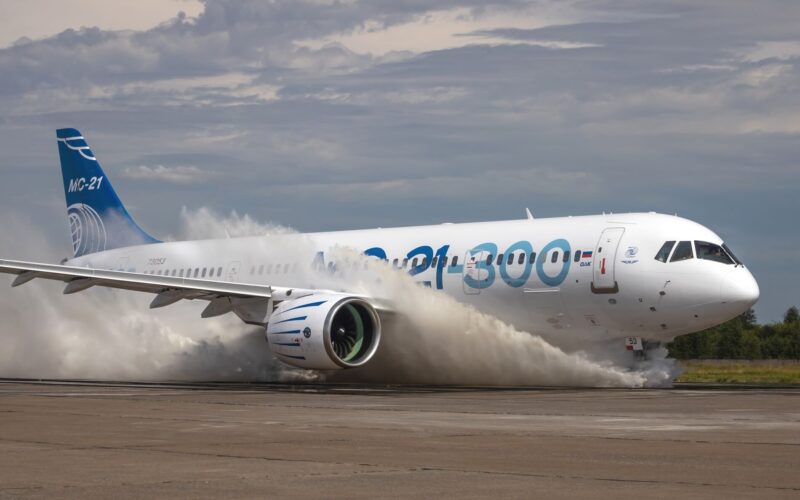Irkut Corporation ran an evaluation of the MC-21-300 prototype behavior over water. The aircraft proved safe to operate on a wet runway.
During the period from 16 to 22 July 2020, the MC-21-300 aircraft performed 29 runs and 3 taxing on water at speeds from 10 to 150 knots (1 knot = 1.852 km/hour) at various configurations of mechanization and power plant modes, including the use of engines thrust reversal.
The tests were carried out on the Ulyanovsk Baratayevka Airport (ULV), where a “pool” of more than 70 m long and more than 20 m wide was arranged. Parameters of the “pool” provided a normalized water depth in accordance with Russian and international requirements, which are established for these types of tests.
In the process of testing the possibility of safe movement on a wet runway in a wide range of speeds without any failure of marching and auxiliary power plants, as well as other systems and equipment of the aircraft were confirmed.
In addition, the tests found that the MC-21-300 aircraft is steadily moving and retains control on the runway covered with water.
The course of testing was recorded by a complex of onboard measurements of the aircraft and a system of video cameras installed on the ground and on the aircraft.
The tests were conducted as part of the MC-21-300 aircraft certification program with the participation of representatives of authorized certification centers.
The Irkut MC-21 is Russia’s answer to the A320neo and the Boeing 737 MAX. It is expected to have a range of 5,900 kilometers, slightly less than the maximum range of the Airbus counterpart (6,300 kilometers) and the Boeing 737 MAX-8 (6,570 kilometers).
Initially powered by Pratt & Whitney PW1400G-JM engines, the airline is expected to also have an option for Aviadvigatel PD-14 in the future. The Russian-made engines are expected to join the certification program with the fifth test frame that was completed in December 2019.
The aircraft will be offered in two configurations: in a regular two-class layout with 163 seats, and with the super-dense interior designed for 211 seats. It is expected to enter service with its launch customer Aeroflot in 2022.

